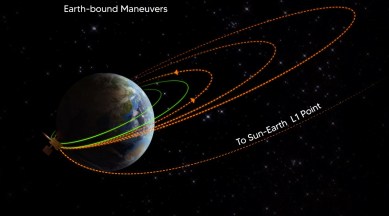On India’s first solar mission, Aditya-L1 begins collecting data: ISRO
The Aditya-L1 spacecraft is scheduled to leave the Earth orbit Tuesday morning and start moving towards the Earth-Sun system's L1 (Lagrange 1) point.

Aditya-L1, India’s first space mission to study the Sun, began collecting data by deploying one of the seven instruments on board on Monday, a day before its departure from the Earth orbit, according to Indian Space Research Organisation (ISRO).
The sensors of the Supra Thermal and Energetic Particle Spectrometer (STEPS) sub-system, part of the ASPEX (Aditya Solar Wind Particle Experiment) payload on the spacecraft, have begun measuring fast-moving charged particles generated in processes within the Sun.
“This data helps scientists analyse the behaviour of particles surrounding Earth,” the ISRO said in a statement.
Aditya-L1 was launched on September 2 using a polar satellite launch vehicle (PSLV-C57) from Sriharikota just a few days after the successful soft landing of Chandrayaan-3’s Vikram Lander on the south polar region of the Moon.
The spacecraft is currently going around the Earth in a 256 km x 121,973 km orbit. Early Tuesday morning, it is scheduled to leave the Earth orbit and start moving towards the L1 (Lagrange 1) point of the Earth-Sun system, the designated location from where it will make observations of the Sun.
The STEPS sensors were activated on September 10 itself, when its orbit around the Earth went beyond 50,000 km, the ISRO said. After the necessary health checks of the instrument, the ground stations have begun collecting data. Data collection by this particular sub-system will continue throughout Aditya’s journey to the desginated L1 point and even after that.
“Data collected around L1 would provide insights into the origin, acceleration and anisotropy (direction-specific properties) of solar wind and space weather phenomena,” the ISRO said.